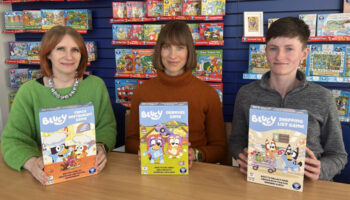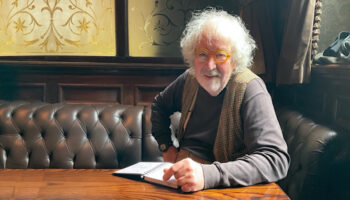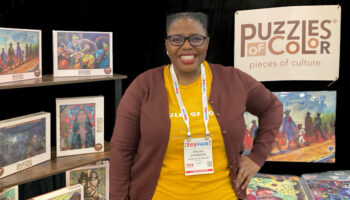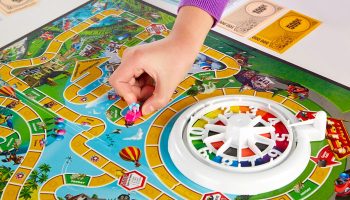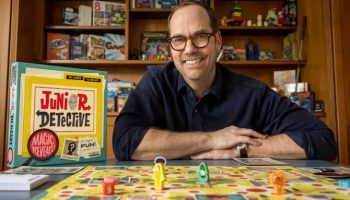Marcia Lewis – daughter of the inventor of Cluedo – discusses myths, mysteries and more

Marcia Lewis! You got married. You retired from your job in Birmingham. You moved to Wales… All to try and avoid this interview?!
Well, it required incredible foresight…
Ha! You’re shrewd! But I wanted to find you and chat about your dad – the inventor of Cluedo, or Clue… And also, your mother, who was pivotal to the game. Is that fair to say?
Yes, I think pivotal’s a good word. Of the two of them, my mother was the more practical and down to earth. Dad was a more self-effacing person. So mom helped dad – and she encouraged him to keep going with it. I don’t know if this of interest, but I always used to call mum “mom…”
Like the American spelling?
Yes – M, O, M. It was what she wanted – I think because it was more usual in the west Midlands, although less so in Bournemouth, which is where I largely grew up. I never asked her about it!
Interesting. And am I right in saying that your mother drew the original board?
Yes. She was quite artistic; a good amateur artist – and she was always fascinated by house designs. Also, I think my mother liked moving house – my parents moved quite often… Whenever they went to see a place, mom would be able to come home and draw a plan of it. So yes – she was the one who drew and did the house design – and therefore designed the board.
And what a design! It’s an icon within an icon. While we’re on the subject, Marcia, was the house inspired by a real place? Some people suggest Highbury Hall near Birmingham… Others suggest a hotel called Tudor Close in Rottingdean…
I don’t remember them ever talking about a place in Rottingdean, no… I don’t know of any connection there at all. Highbury Hall was just down the road from the house in Kings Heath… But I think the board was an amalgam, really, of all of the lovely hotels that my dad used to play in when he was a professional musician. Before the war, he played in lots of beautiful places – and he loved music all his life; it really was his main passion.
Great answer, thank you. And returning to your mother… Did she have any other input that you know of?
Well, certainly she had to play it a lot! Ha! But beyond the board, it was mostly giving the encouragement that dad needed. Because – even with a little discouragement – I could easily have seen him giving up… If somebody was a bit lukewarm about it, he would very likely have said, “Oh, there’s obviously nothing in it…” And mom would’ve really encouraged him to keep going.
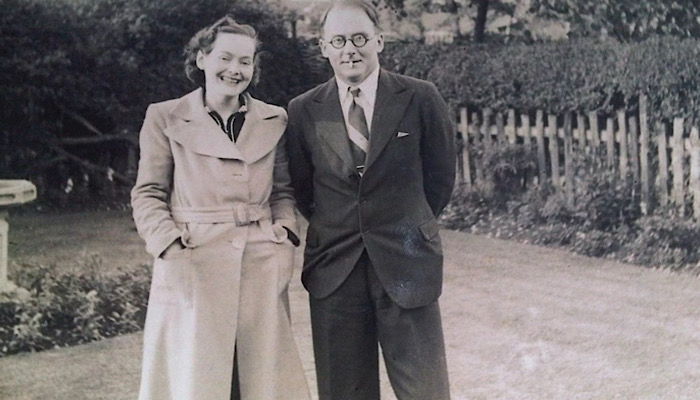
That makes sense because it took agggggggggges to get to market, didn’t it? There were plenty of times when your dad might’ve thrown in the towel…
Oh yes, getting it published wasn’t easy. Even things that sound straightforward took time… Getting to see Waddingtons, for example. That only happened because my parents knew Geoffrey Bull. He already had a game called Buccaneer published with Waddingtons. So that opened the door – but even then, it took ages – just as you say.
And in context, that’s partly because of post-war shortages in the UK. So it finally came out in 1949; Waddingtons had agreed to it in 1945… And your dad had registered a patent in 1944. It wasn’t called Cluedo, though?
No, it was called Murder!
Do you know whether or not your dad liked the name change?!
Oh, I think he felt that Cluedo was probably more catchy! But, you know, even before the patent was approved, dad had to make quite a number of little changes. The patent office was very nitpicky – as you can imagine. And it took a long time to do things because it was in the days before any word processing or desktop printing. Even a minor change would mean writing some things out all over again by hand – and often getting them retyped, with carbon copies, without making further errors!
Oh, gosh – yes! That’s easy to overlook. I do want to chat about some of the design changes. Briefly, though: why do you think Cluedo remains so popular 75 years on?
There are a couple of reasons, I think. First, it might have become popular at the time because of the war. For years, countless people had spent may evenings behind blackout curtains. Life was very boring in lots of ways because so many entertainments had been shut down. Also, so many things were still rationed – food, clothing, fuel… Materials of all kinds. And remember: boredom was partly what spurred him on to create it in the first place…

Makes sense: boredom compelled your dad to create it… And I should say at this point, Marcia, that I’ve done an article on Cluedo at 75. People can read that here. But yes, those post-war years were tough in Britain. The boredom and strain didn’t just vanish in 1945…
Right. Another reason was that Cluedo was intended to be a diversion for adults. It wasn’t a children’s game that worked on the the basis of luck. It was based on reasoning and deduction. So although children love it, it was primarily aimed at adult players. And finally, there’s the subject matter. Murder is timeless… It’s just as relevant now as it was then; there’s just as much interest in murder and detection today as there ever was. It never dates, does it?
No, you’re absolutely right. That theme has always been gripping. I’m curious, though… Did your dad try his hand at other games? Or was it one and done?
Ah! He did develop a couple of others actually. We know hardly anything about them, but one was called Treasure Hunt. He did send that one to Waddingtons – right at the end of 1950s. It didn’t come to anything. The other one – which was about prospecting – was called Goldrush. Whether he thought that theme might appeal more to Americans, I don’t know. I still have most of the correspondence between him and Waddingtons, but I can’t see any sort of exchange with them about that. He may not have shown them.
We’ll have to be content with his inventing just one of the greatest board games in history! And that leads to a question I almost daren’t ask… I’m assuming there were a few Cluedo prototypes – but I’ve never heard about one being in a museum, or on display anywhere. What happened to them?
Well, there were various prototypes, yes – and little wooden characters, the playing pieces that they made… I can remember them. One was painted silver – because there was a character called Mrs. Silver in the original game. Another was gold – Mr. Gold was a character… But I’m afraid all of those got lost in the various house moves. It’s a real shame, because there were lots of that sort of thing. All the wooden characters, all the little weapons… I can remember a little bottle of poison and a syringe as well. But no: all lost, I’m afraid.
I had a horrible feeling you were going to say that. You might be interested to know that I mocked up pictures of what all the characters, weapons and rooms might have looked like if the patented version of the game got made without any changes!
Oh, how fascinating. I’d love to see those. And the floorplan? With a gun room?!
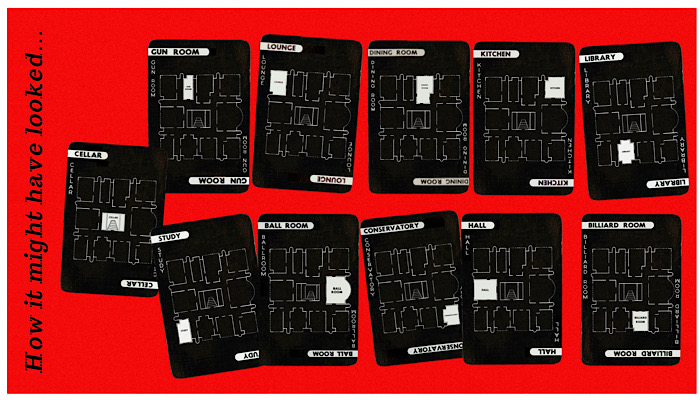
I put a Gun Room and Cellar on the cards, yes. I didn’t make up model weapons – but I like that you played with a little prototype poison bottle!
Yes! I did, I remember that. It had a little skull and crossbones on it. And the Irish cudgel; the shillelagh… But I do still have mementos – the history in all the letters. And, of course, a lot of the original papers are in my dad’s handwriting.
Oh, wow. Amazing. It’s only now occurred to me to ask: did you play Cluedo growing up? And how aware were you that it was your dad’s game?
Oh, yes. Absolutely! But you know, before I was born, mom and dad had a little girl who died at 11 months… So I was an only child growing up, which meant it was just two or three of us playing a game. We’d play Snakes and Ladders, and draughts – and I got into chess for a while. We weren’t big board game players though, because they weren’t the social occasion one has with a larger family. But I was very conscious – from when I was able to play Cluedo; I suppose, at the age of about seven – that it was dad’s game. They usually let me win, too!
And how does it feel to know that your family was responsible for this amazing game? This cultural phenomenon?
Well, I’m very proud, of course! I mean, it’s part of people’s culture now in probably more than 40 countries… And it’s something that’s brought pleasure to millions and millions of people; it’s brought families together for generations: adults and children of all ages. Then, beyond the game, it’s taken off in ways that my dad couldn’t even remotely conceive! Could never have imagined it…
Well, on that: what awareness did he have of Cluedo becoming more than a game?
Good question! He was aware of the plays and the film… They happened in his lifetime. And then there was a TV show; a sort of whodunnit quiz with actors playing the characters. He was aware of that. But all the online games and spin offs and Christmas crackers, tissues boxes, mugs, aprons, utensils – no… The branded products came a bit later.
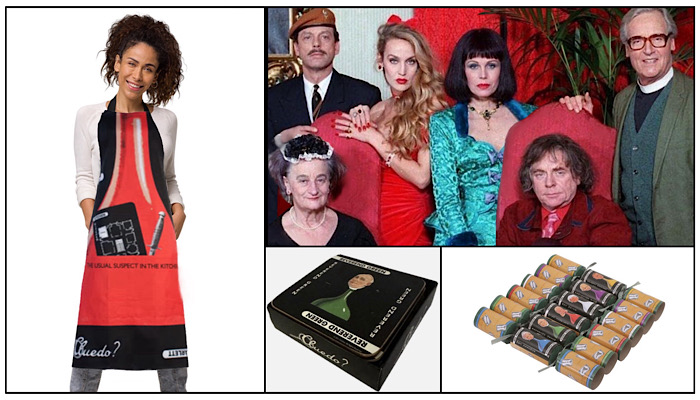
Right. Your dad passed over shortly before Hasbro bought Waddingtons Games… And we can safely say that it’s Hasbro that turned Cluedo into a behemoth. But your mother predeceased your dad?
That’s right. Dad lived to a good age – he died when he was 90 – and he outlived my mother who was 10 years younger.
That leads to a question which has the potential to be awkward, Marcia – so I’ll be direct. I had heard that your dad passed “broke and bitter”. I don’t think those things are strictly true, but he did have dementia, did he not?
He had some form of dementia, yes, and my mother had cancer, sadly. But he certainly wasn’t bitter, no. As regards money, he was shorter of it than I knew. I didn’t find that out until I was dealing with things after he passed… It’s probably fair to say he was worried about money. And you know, the biggest problem around what he earned from the UK sales of Cluedo was actually the very rampant inflation in the mid 1970s.
Well, let’s talk about that: the thorny issue of missed royalties… Your dad let the overseas rights go for what – in those days – was a reasonable sum of money…
£5,000…
Right. That would be a reasonable sum back then but – in hindsight, of course – that proved to be an unreasonable sum of money; a fraction of what they were worth. I understand your dad was quite serene about that?
Yes, he was quite fatalistic because – as we’ve discussed – he was a self-effacing man. He took that in his stride. My mother, though, felt that they’d been – well, not cheated – but that Waddingtons had been excessively hard nosed about it when it became known that it was really taking off in America particularly.
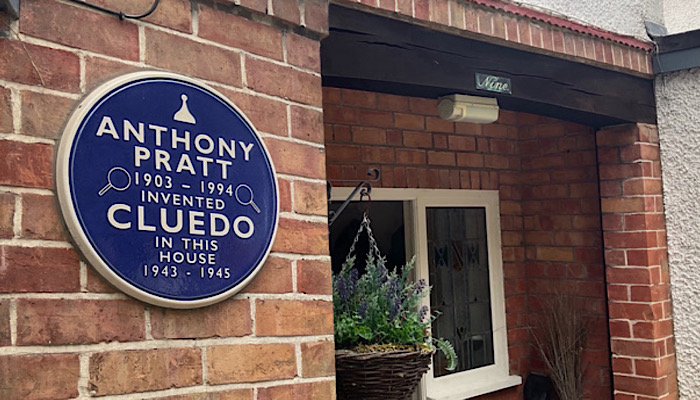
Because there’s some question as to how well it was going to sell in America at the point when he sold those overseas rights?
Yes, exactly. It’d taken quite a long time to get Cluedo printed and on sale in the UK. But I’ve heard that Clue was on sale in the USA before it was out over here. I don’t know whether that’s accurate or not! But my dad was philosophical about it. He thought it was an achievement in itself, and he was proud of it. He liked that it had brought people a lot of joy! So missing out on those royalties didn’t eat him up. Not at all; nothing like that.
Got it…
I suppose my mother wondered if Waddingtons had been truthful when they told dad that it wasn’t selling so well abroad… Because one of the main reasons why he sold the overseas rights – this would be in four years after it was first published – was that they’d said to him, in effect, that it wasn’t taking off overseas. Certainly, they gave every impression that there was no reason to think it would do anything at all on the scale that it did.
Which is possible… Giving them the benefit of the doubt, it could’ve sold okay and then dipped, or it could’ve been a really slow burner…
And then there was the sum itself: £5,000 was a good deal of money back in 1953… And I’d just been born, so I suppose whether to accept it or not was a hard decision to make. I suspect they thought it was a responsible thing to do because you could buy a very good house for £2,000 back then. And a car… A car would’ve cost less than £500. And something else that’s true about those days… People didn’t question what those in authority said to them. Nowadays, somebody in a situation like that would talk to a financial adviser…
Or have a lawyer look over the contract with a fine-tooth comb!
Yes, they’d have all the international contracts checked out, and ask to see the sales figures… See how that matched what they were being told. But in those days, people were so much more deferential… If a bigwig company like Waddingtons said they didn’t think a game was going to have much of a profile outside Britain, most people would’ve believed them.
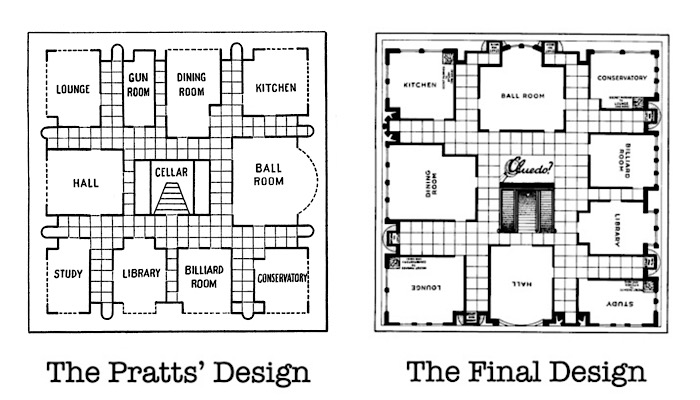
I completely agree with you. And, of course, your parents did buy a house with some of the money!
Right. And the rest was in a savings account so – as I say – that just got eaten up when inflation was rampant. Because people like my dad didn’t invest in the stock market in those days; nothing like that… So it was really the very rapid inflation that did for his finances, I think.
Absolutely fascinating. Well, we need to start wrapping things up Marcia… Before we do, is there anything else you’d like people to know about your parents?
Perhaps just how lovely they were! I already said mom was more the practical kind… She had an awful lot of common sense, but she was also such a kind person, a really lovely mother. They were both lovely! And they both left school early. I think my mother left when she was 14 to look after her parents and the family. And dad left when he was 15 because whatever money the family had went to the education of his older brother who trained be a vet.
Oh!
One reason that he was probably quite glad to leave school, though, was that he was very shortsighted. In those days, anybody that wore glasses was teased at school – and to avoid that, I think he didn’t wear glasses when he should have. As a result, he couldn’t see the blackboard properly. So I think he was probably much cleverer than people realized.
But he WAS clever?
Yes, very clever – just mostly self taught. He read tremendously – always had his nose in a book. He was very interested in psychology – particularly criminal and abnormal psychology… And philosophy, detective fiction, and a great deal of literature from all periods; all the classics. I couldn’t tell you how many times he read the works of Dickens! History as well, and chemistry he was interested in… I just think he must have taught himself a tremendous amount.
Remarkable. What was his sense of humour like, Marcia?
Fun! He liked satire – he didn’t have any time for pompous people; certain politicians and military types… Anyone who was full of their own importance. With people like that, he enjoyed seeing their bubbles popped because he didn’t like pretentiousness. He also had a sense of the surreal as well. That showed in some of the television programs he’d watch. Monty Python’s Flying Circus comes to mind. He also liked The Avengers with Diana Rigg and Patrick Macnee, and he liked The Prisoner… That wasn’t for mom of course – it was all a bit silly!
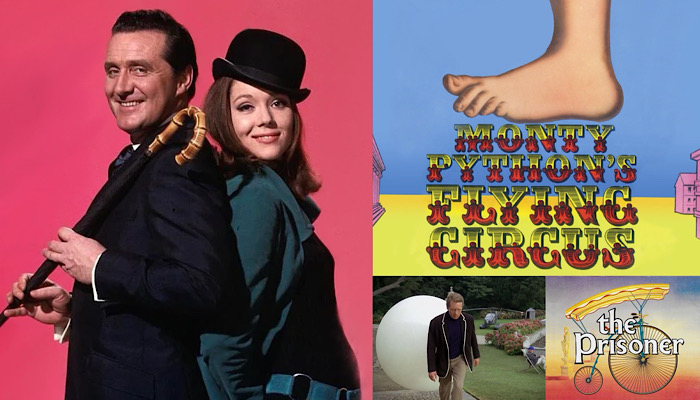
Ha! I love that they complemented each other like that. What a wonderful team – what a wonderful game and with wonderful legacy… Thank you for telling me about them in such detail, Marcia, and thank you for spending so much time with me. I can’t tell you how thrilled I am.
Oh, no… It’s I that must thank you. It’s very uplifting to meet you and hear how enthusiastic, knowledgeable and committed you are…
Oh, well, gosh… You’re very kind – thank you… Too kind! And how lovely for me to hear the word “committed” without the words “I’m going to have you” in front of them. It’s a… It’s a rare treat. I can’t thank you enough, Marcia.
–
To stay in the loop with the latest news, interviews and features from the world of toy and game design, sign up to our weekly newsletter here





